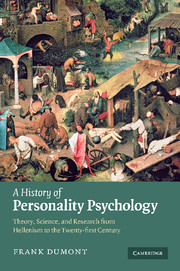 A History of Personality Psychology
A History of Personality Psychology Book contents
- Frontmatter
- Contents
- List of tables and figures
- Preface
- 1 Historical precursors of personality theory
- 2 From illness to wellness models of human nature
- 3 Developmental perspectives on personality: from youth-based to life-span models
- 4 The biology of personality
- 5 Trait theories and the psychology of individual differences
- 6 The puzzle of the self
- 7 Culture and personality
- 8 Gendered personality
- 9 Emotions and reasoning: a definition of the Human
- 10 Taking the measure of the Human: benefits and inherent limitations of personality measures
- 11 Can personality change? The possibilities of psychotherapeutics
- 12 The disordered personality: evolution of nosological systems
- 13 Eight appendices: at the margins of personality psychology
- References
- Author index
- Subject index
12 - The disordered personality: evolution of nosological systems
Published online by Cambridge University Press: 03 May 2010
- Frontmatter
- Contents
- List of tables and figures
- Preface
- 1 Historical precursors of personality theory
- 2 From illness to wellness models of human nature
- 3 Developmental perspectives on personality: from youth-based to life-span models
- 4 The biology of personality
- 5 Trait theories and the psychology of individual differences
- 6 The puzzle of the self
- 7 Culture and personality
- 8 Gendered personality
- 9 Emotions and reasoning: a definition of the Human
- 10 Taking the measure of the Human: benefits and inherent limitations of personality measures
- 11 Can personality change? The possibilities of psychotherapeutics
- 12 The disordered personality: evolution of nosological systems
- 13 Eight appendices: at the margins of personality psychology
- References
- Author index
- Subject index
Summary
Disorders of personality are not medical entities; nor should they be seen as human perversities either. Viewed from an ecological and evolutionary perspective, we conceive them as problematic styles of human adaptation. They represent … individuals whose constitutional make-up and early life experiences have not only misdirected their development, but have also constructed an unsatisfying sense of self, a problematic way of expressing thoughts and feelings, as well as a troublesome manner of behaving and relating to others.
Theodore Millon (1996)Universal norms of behavior
A book that deals with personality as its core construct cannot avoid dealing with disordered personality as well, especially as the latter is to a certain extent socially and variously defined. Personality disorders were defined in the third edition of the Diagnostic and Statistical Manual (American Psychiatric Association, 1980) as “personality traits [that] are inflexible and maladaptive and cause either significant impairment in social and occupational functioning or subjective distress” (p. 305). Norms for civil behavior are constantly evolving. From era to era, each society imposes shifting normative behavioral schemas on its members as they engage in routine social and occupational activities. If we accept this principle, the behavioral patterns defining various personality disorders evolve historically but also vary cross-culturally. Drastic, collective divergence from those norms gives rise to new, ultimately respectable cultural models of personality disorder – as well as to “scandal” and moral outrage. In the light of recent advances in molecular genetic and epigenetic research, these principles have become suspect.
- Type
- Chapter
- Information
- A History of Personality PsychologyTheory, Science, and Research from Hellenism to the Twenty-First Century, pp. 407 - 450Publisher: Cambridge University PressPrint publication year: 2010


